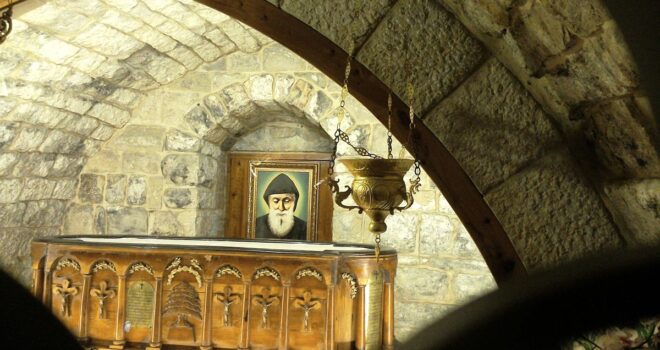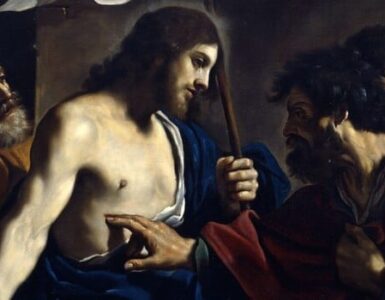Today, on July 24, 2024, we celebrate the feast day of St. Charbel Makhlouf, a Lebanese Maronite monk, whose life of devotion and miracles continues to inspire Catholics worldwide.
The Life of St. Charbel
Born Yousef Antoun Makhlouf on May 8, 1828, in the village of Bkaakafra in North Lebanon, St. Charbel grew up in a devout Christian family. From an early age, he was drawn to the ascetic life, often withdrawing to a nearby grotto to pray and meditate. His piety was so evident that villagers nicknamed him “the saint.”
In 1851, Yousef joined the Lebanese Maronite Order, taking the name Charbel. After completing his theological studies under teachers including St. Neematallah Hardini, he was ordained a priest on July 23, 1859. For 16 years, he lived as a monk in the monastery of Annaya.
Seeking even greater solitude, St. Charbel requested to become a hermit. On February 15, 1875, he entered the hermitage of Saints Peter and Paul, where he spent the remaining 23 years of his life in prayer, worship, and manual labor.
St. Charbel passed away on Christmas Eve, 1898. Months after his burial, a mysterious light emanated from his tomb. When his body was exhumed, it was found to be incorrupt and exuding blood and water. News of this miracle spread, and many sought his intercession, leading to numerous reported healings.
St. Charbel was beatified on January 5, 1965, by Pope Paul VI and canonized by the same pope on October 9, 1977. His legacy of holiness continues to touch lives around the world.
The Interior Life of St. Charbel
St. Charbel’s spiritual journey was profoundly shaped by various elements of Catholic tradition and practice. The bedrock of his life was Scripture, especially the Gospels, which guided his every step. It is said that during his novitiate, Charbel read the book “The Imitation of Christ” by Thomas à Kempis. This spiritual classic emphasizes the interior life and withdrawal from the world, which resonated deeply with Charbel. Devotion to the Blessed Virgin Mary, particularly through the Rosary, was another cornerstone of Charbel’s spirituality, fostering and complementing his Christocentric focus.
The liturgy of the Maronite Church also played a crucial role in Charbel’s spiritual life. The rich symbolism, simple and faithful prayers, and profound mysticism of the Divine Liturgy (Qurbono) nourished his soul daily. For him, as for all Eastern Christians of his time, the liturgy was truly the heart of spiritual life, the means by which heaven and earth were united, and the faithful were drawn into the very life of the Trinity.
Perhaps most significantly, Charbel’s spiritual life was anchored in Eucharistic adoration. He spent long hours in silent contemplation before the Blessed Sacrament, a practice deeply rooted in the traditions of Eastern monasticism. For Charbel, these periods of adoration were a source of profound spiritual nourishment and a tangible expression of his intense love for Christ.
These various elements—Scripture, liturgy, Marian devotion, and Eucharistic adoration—along with his study of spiritual classics like “The Imitation of Christ,” formed the rich tapestry of Charbel’s spiritual life. This profound spiritual foundation made it natural for him to embrace the rigorous sacrifices and severe penances that would characterize his later years.
The Words of St. Charbel
St. Charbel was known for his few but profound words. His sayings reveal a man of deep humility, unwavering obedience, intense devotion to God, and detachment from worldly ties. Let us explore some of the most memorable quotes of this great saint.
As a young man tending to his cow, Charbel demonstrated his priorities: “Now, my cow, rest so I can finish my prayer. The priority is always to God.” This simple statement encapsulates his lifelong dedication to prayer.
His commitment to the monastic life was absolute, even in the face of familial ties. When his mother came to visit him during his novitiate, he said to her from behind the door, without seeing each other: “If God wills, one day we shall see each other in heaven.” This poignant moment illustrates his complete dedication to his vocation.
St. Charbel’s devotion to the Virgin Mary was evident in his advice to villagers seeking guidance for their salvation: “If you wish to be saved easily, have a special devotion to the Virgin Mary. She is capable of saving those who have a true devotion to her.”
His commitment to the monastic life was unwavering. When invited to visit his village after ordination, he replied, “A monk who goes to his village and returns to the monastery would almost need to go through the novitiate again to become a monk anew.” This showcases his understanding of the need for continuous spiritual discipline.
St. Charbel’s humility shines through in many of his interactions. When asked if he favored novices from his village, he stated, “No. I don’t favor them inwardly or outwardly. All brothers are equal to me.” This reflects Christ’s teaching of loving all equally.
His obedience was legendary. Once, when the superior jokingly said they’d throw him in the oven for fuel, Charbel knelt and said, “May God empower me to obey.” This response left the superior in awe of Charbel’s deep reverence for the monastic vow of obedience.
St. Charbel’s detachment from worldly possessions was evident in his handling of money. When offered a Mass stipend, he extended his hand, took it, and kept his hand extended until another monk arrived, saying, “Take these.” He avoided touching money, giving himself totally to God through the monastic vow of poverty.
His spiritual insight was remarkable. Once, when sent to pray over a sick person, he knelt to pray halfway through the journey and told his companion: “The sick person has died. There’s no need to continue my journey with you.” This demonstrates his deep connection with the spiritual realm.
St. Charbel’s compassion extended even to animals. When scolded for allowing foxes to eat from the monastery’s vineyard, he simply replied, “I found them hungry. I let them eat a few grapes.” This shows his gentle nature and care for all God’s creatures.
His detachment from worldly concerns is beautifully illustrated in his response to a question about his journey. Instead of giving worldly details, he replied: “I went from here going and came from here coming.” This shows his focus on the spiritual rather than the material aspects of life.
When his niece asked him to leave her his share of the family inheritance after his brother’s death, Charbel said: “My brother died this year? I died when I left Bekaa Kafra. The dead neither inherit nor bequeath.” This powerful statement underscores his complete renunciation of worldly possessions and ties.
His love for the Eucharist was paramount. In his final moments, struck by illness during Mass, he repeated, “Abo d’qushto” (Father of Truth), referring to the Eucharistic prayer. Even in death, his thoughts were on the holy sacrifice of the Mass. This prayer, which St. Charbel recited daily during the celebration of the Eucharist, beautifully encapsulates his deep reverence for this sacrament:
Father of Truth, behold Your Son, a sacrifice pleasing to You. Accept this offering of Him who died for me; behold His blood shed on Golgotha for my salvation. It pleads for me. For His sake, accept my offering. Many are my sins, but greater is Your mercy. When placed on a scale, Your mercy prevails over the weight of the mountains known only to You. Consider the sin and consider the atonement; the atonement is greater and exceeds the sin. Your beloved Son sustained the nails and the lance because of my sins so in His sufferings You are satisfied and I live.
This prayer reflects St. Charbel’s profound understanding of God’s mercy, the significance of Christ’s sacrifice, and the transformative power of the Eucharist. It serves as a testament to his lifelong dedication to God and his role as a conduit of divine grace.
St. Charbel’s life teaches us the power of simplicity, obedience, and unwavering faith. His words, though few, carry the weight of a life lived in complete devotion to God.
A Prayer to St. Charbel
Let us conclude with this beautiful prayer from the Maronite liturgy for the feast day of St. Charbel:
O Christ Our Lord,
You have called Father Charbel to follow your footsteps in the light of
your hidden life and your offering on the Cross.
You have carried him up to You when he died the night of your birth here
on earth.
Like this You have marked the History with the great and deep
resemblance between your Birth on Earth with us, and the birth of
Charbel with You in Heaven.
You willed, O Lord, that between your life and the life of
Charbel there will be many resemblances and similarities:
Like You, Charbel was born in a village like Bethlehem, from
two pious and virtuous parents.
Like You, Charbel lived from the work of his hands, in
BeqaaKafra and in the Monastery.
Like You, Charbel went to the wilderness into a life of solitude,
to fast, to pray, to be tempted and to win over all temptations.
Like You, Charbel carried his cross, the cross of the monastic
and ascetic hard life, and bore the pains from wearing rough goat
coat, and wires of sticky metal under his monastic habit.
Like You, Charbel offered himself every day at Mass to the
Heavenly Father.
Like You, Charbel was taken down from the “Golgotha of his
high hermitage of Annaya” and was buried wrapped in his
religious habit as in a shroud.
Like You, as the blood and water which flowed down from your
side which was pierced with the lance, so Charbel’s body flowed
with water and blood.
Like You, as your Tomb shined with the Light of Glory,
so did the tomb of Charbel shine with a glorious light.
Like You, and through You Charbel healed the sick, and people
flocked to him in great numbers from every place on the planet
to his wondrous tomb.
Like You, when Peter the Head of the apostles proclaimed your
Good News on the day of Pentecost to the world, so did the pope
as your Vicar, and the Successor of Peter declare Charbel a
“blessed” during the time of the New Pentecost, at the
conclusion of the Second Council of Vatican, the largest
gathering for Christianity in the History of the Church.
For this O Lord, we now sing, with the sweet perfume of this
incense, the prayer which was the sign of the unity between Charbel’s life
and your life, that he used to repeat every day during the celebration of
the Holy Sacrifice, at the Mass saying:
“You have united O Lord, your Divinity with our humanity,
and our humanity with your Divinity.
Your Life with our mortality, and our mortality with your Life.
You have assumed what is ours, and You have given us what is yours.
For the Life and Salvation of our souls
To You Be Glory Forever.
Amen.
Photo of St. Charbel Makhlouf’s Grave retrieved from WikiMedia Commons.
Saint Maron – Annaya monastery – Home Page. (n.d.). Saintcharbel.com. Retrieved from http://saintcharbel.com/home.php?lgid=0.











